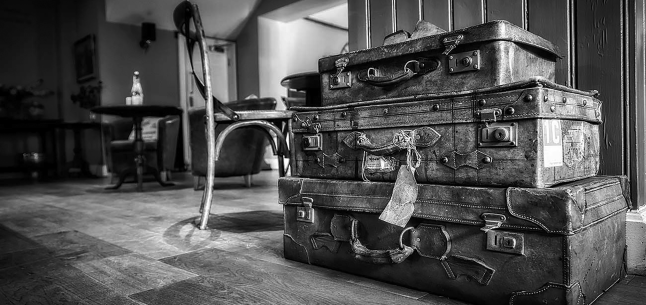I love to write short stories that offer inspiration to those who read them. I have decided to capture these stories in a book that I hope to publish in 2016 (or maybe 2017 or 2018). Every few months, I will send out another chapter that I am considering for the book so that I can get some feedback. Please note each story is only the introduction to the chapter, not the entire chapter. I value your comments, thoughts, and observations – so please send them to me!
For the last 40 years, I have gone on at least one backpacking trip per year. Over time, there have been 55 trips, around 3500 trail miles, over 350 nights in the wilderness and almost 60 friends and family members who have gone with me on the various trips. In all that time, we have never had a major injury and, other than some scary moments, we have never lost a person overnight.
When my son, Dylan, was nine, we went on our first father-son trip with three other dads and their sons. We have continued the tradition every year and tomorrow we are leaving for a 55-mile loop in Northern Yosemite. The boys are now much bigger and stronger, so we let them carry the heavier packs.
Before our first trip there was a lot of concern for safety… mostly from the moms.
We had a barbeque to plan the trip and assure everyone that the trip was just a “walk in the woods.” After a while the normal questions started: “Are there bears? Is there poison oak? What happens if someone gets hurt? Will you make sure they don’t burn themselves at the fire? Do they need pajamas?” The questions went on and on.
I remember looking at the moms and saying, “Everything will be fine- to ensure safety, we have rules on the trip.” I thought that would be the end of it, because we really didn’t have rules, other than common sense. “Well, what are the rules?” the moms asked me.
Thinking fast, I said, “We have two rules on the trail.” Everyone got quiet, wanting to hear what the rules were and assuming the rules were going to be profound and ensure safety. “Rule #1 is that the boys have to brush their teeth at least once a day; Rule #2 is that they have to wash their hands after they go to the bathroom.”
Dead silence followed.
We are not completely crazy and, obviously, there were more things for them to be aware of than brushing their teeth and washing their hands, but the basic concept was that the boys needed to figure out a lot on their own and to learn through practice to do the right thing. We expected the boys to carry their own equipment, to help set up camp, and to listen when we were telling them something important. They were constantly reminded that the wilderness is beautiful, but anything could happen at any time.
I have never really been a “rules” person. I believe people should be capable of governing themselves in an appropriate way. This theory follows in business as well. If you hire the right people and foster the proper environment, their own self-motivation and drive to succeed for themselves and for the company will ultimately require less oversight and direction.
Nearly 15 years ago, Jim Collins published the book, Good to Great: Why Some Companies Make the Leap and Others Don’t, a study of how average companies become great, while others fail to make the leap.
According to Collins, these companies knew that you have to get “the right people on the bus (and the wrong people off the bus) and then figure out where to drive it.” Rather than being governed by a set of rules and infinite bureaucratic mechanisms, great companies create cultures of discipline that weave employee freedom and responsibility together within a broad framework built by the company’s leadership. Self-disciplined employees do not need a thousand rules or monetary incentives to ensure they are doing their job and doing it well. They don’t need to be micromanaged, which allows the company leadership to manage the system, and not the people. Study after study has shown that the companies that build a culture around employee freedom, and creativity will do better. The employees will grow and learn to handle difficult situations with confidence and ease.
Now back to backpacking. The first father-son camping trip was a success and we continued the tradition on an annual basis. Over the years, the boys grew, the trips became longer and more adventurous, but the two rules never changed.
When the boys were fifteen years old, we had quite a scare. There had been more snow than usual during the previous winter, and many of the trails were covered with snow and ice and difficult to follow. At this point, the boys had been on five backpacking trips, so when they asked to go ahead of us on the trail, we agreed. We showed them on the map where we were planning to set camp for the night and pointed to the only trail junction in between. “Make sure you stop at the junction,” we repeated a couple of times.
The boys took off, and we followed at our own pace. Several hours later in the late afternoon, after a 9-mile hike and several mountain passes, we got to the campsite location we had pointed out on the map. We looked around- no boys. We looked up and down the river- no signs of the boys.
Over my years of being a father, I have “lost” my kids in a number of different places: stores, shopping malls, Chucky Cheese and even the lobby of The Ahwahnee Hotel in Yosemite Valley. But those situations were nothing compared to the realization that our sons were missing deep in the wilderness of Yosemite. With darkness coming and a pit in our stomach, we came up with a plan.
Looking at the map and the trail the boys most likely had missed, figuring they probably saw a trail at the bottom of the snow-covered slope and followed it. They went right instead of left and the next junction was miles from where we were. Big problem. Leaving some stuff at camp and not knowing what lay ahead, we took off back up the mountain and toward the trail junction at least nine miles away uphill. It was past five in the evening and we knew we couldn’t make it until darkness fell.
Several hours later and in the dark we reached the junction and were greeted with a surprising sight- the boys. Realizing their mistake, they had set up a marker on the trail and put up their tent to wait for us and get away from the mosquitoes. When they finally realized that they went down the wrong trail, they decided to set up camp rather than try to navigate the washed-away trails in the dark.
They were not panicking (though they were relieved we had found them before nightfall)- in fact they seemed quite proud of themselves for “surviving” on their own. It’s not a big deal, Dad. We knew we messed up, and figured we would just set up camp and wait for you.
This story always makes me think of the lessons in Good to Great, namely the importance of finding people who are capable of figuring stuff out without constant supervision or direction. On the first camping trip, we (the dads) had set the framework, the “culture of discipline.” We laid out the two rules they were expected to follow and trusted them to be able to handle themselves in the middle of Yosemite. With this loose structure in place, the boys were given large amounts of freedom and large amounts of responsibility. They learned as they went along, and not only survived in the middle of the woods, but were also able to solve the problem all by themselves.
The only thing they still haven’t figured out is how the dads divide up the “community equipment and food” in even stacks and then manage to give them the heavier stuff.
“Whether you think you can or you think you can’t- you’re right.”
-Henry Ford
For more stories like this one, please check out my book, The Toughest Guy I Ever Knew and Other Short Stories.
DISCLAIMER:
This material has been prepared for informational purposes only, and is not intended to provide, and should not be relied on for, accounting, legal or tax advice. The services of an appropriate professional should be sought regarding your individual situation.




